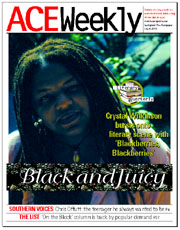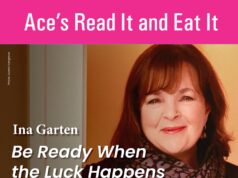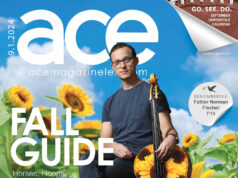BY RHONDA REEVES
Ace coverstory July 6, 2000
These stories come from the ordinary and the extraordinary. From black country women with curious lives. From struggle, from fear, from love, from life, from the gut, from the heart. Black and juicy, just like a blackberry.
-from Blackberries, Blackberries
The godmother of creative writing in Lexington,” is how author Gurney Norman

describes Crystal Wilkinson when he calls up to recommend her new book, Blackberries, Blackberries. He raves about her work with the Affrilachian poets, her tenure as assistant director (and longtime teacher) at the Carnegie Center for Literacy and Learning, and her work this summer teaching with the Governor’s School for the Arts. Then he raves some more about the book, mentioning several stories, including one where a character “spreads out a quilt and gets herself naked and, well…” he pauses, “I don’t want to ruin it for you. You’ll just have to read it.”
Over dinner, when asked why Norman seems to have appointed himself “godfather” to this particular book, Wilkinson laughs and insists she doesn’t know. Though she admits, “he fusses at me all the time. He says I should say ‘thank you,’ instead of apologizing when people compliment me,” adding, “if I’m the godmother, then he’s the grandfather.”
Of Norman’s mentor relationship to the Afrilachian poets (and to countless other writers), she says, “He embraced us. He pushed us as a group, and as individuals.”
Her work at the Governor’s School, in addition to her duties at the Carnegie Center — and now promoting a new book — have left Wilkinson with an insane summer 
She’s also had to fight downtown N’ Sync traffic, prompting some good-natured joking about all the rabid teens and their traffic patterns (“I remember when I would come to town too, though,” she says, “and you stay in one lane the whole time because you don’t want to get lost”).
Nothing that God ever made is the same thing to more than one person. That is natural. There is no single face in nature, because every eye that looks upon it, sees it from its own angle. So every man’s spice-box seasons his own food. Naturally, I picked up the reflections of life around me with my own instruments, and absorbed what I gathered according to my inside juices.
-Zora Neale Hurston,
Dust Tracks on a Road
Every debut effort by a new author prompts questions of autobiography, and Wilkinson responds, “there’s some fiber… some thread of truth in all of [the stories].” She’d told one of her students earlier that day, “you take reality, and add on layers.”
“But they’re all fiction,” she adds firmly. “Nowhere near creative nonfiction. Some characters are distorted versions” or share some composite traits with real people. “There are places you’d know.”
Asked to clarify a passage about a Danville bar (when, of course, everyone knows Danville is in a dry — parched — county), she happily clarifies two establishments (an old Ponderosa and a place called the Barn in Bonyville) which were familiar to the black community and had a BYOB policy.
She elaborates further about one of them, “It was a real Barn. I mean, you’d go in tobacco season and there’d be music and speakers, and tobacco hanging from the rafters and people dancing.”
Though there is no story in the book called “Blackberries, Blackberries,” Wilkinson thinks it fits this collection of stories, “settling on ‘Blackberries, Blackberries’ when I realized all the stories were about black women in small towns and rural areas, so I began thinking about something that would be symbolic of what all those women encompass and I finally landed on blackberries.” She’d had a collection of poetry with blackberries in the title, and decided it was always acceptable to steal from herself. She likes the image, because to eat this fruit, one has to risk the “prick of the briars to reach the sweet, dark fruit of a blackberry and I decided that was a good description of us rural black women and it stuck.”
The eighth grade days flowed in their hungry path and I grew more conscious of myself; I sat in classes, bored, wondering, dreaming. One long dry afternoon I took out my composition book and told myself that I would write a story…It was crudely atmospheric, emotional, intuitively psychological, and stemmed from pure feeling.
– Richard Wright,
Black Boy (American Hunger)
Wilkinson went to school in Casey County, and from there, went on to EKU for journalism school.
Why EKU?
She’s frank. “I grew up in Casey County and was one of three black kids, kindergarten through high school. I decided I wanted to be around black people [beyond just those] who were not in my family. I didn’t want to go to K-State [Kentucky State University has a primarily black population]. I had one tour of EKU and thought the campus was beautiful.”
She didn’t have a lot of mentors to turn to for advice. “My grandparents were farmers. I was the first to go to college. [EKU] had a good journalism school, but” she adds, “I don’t know how to put it except just to say it. I’d been around white people my whole life. I thought I’d meet some new black folks.”
As for why she selected the journalism school, she says, “I had a scholarship in visual art, but I wanted to write.” She didn’t know exactly what she wanted to write, and the best advice she could find suggested that journalism school was the place for people who wanted to grow up to be writers.
Once at EKU, she remembers being something of “an … enigma… to black and white students. I was black. But I had this country accent.” The black students with urban roots didn’t know what to make of her. She smiles, recalling how “they’d say, ‘Chrissy’ — that’s what they called me back then. ‘Chrissy, come over here. Say niiiight.'” And she drawls an obligingly long “I.”
She smiles… but, she also knows that those episodes are at least part of the reason she went through “a period where I tried to purge my countryness.”
She continued that phase while working at the Lexington Herald-Leader as a news assistant — trying to fit into a more corporate image.
She found that job “exciting. I saw news before it happened. And they threw stories at me.”
But just as she realized in journalism school that “this was not quite what I wanted,” when she went to the Herald-Leader, she also concluded, “well, writing obituaries was not quite what I wanted either.”
From there, she went on to a few public relations/communications type gigs, saying, “I had this corporate mask I wore. ‘Hi. My name is Crystal,'” she says, in a fair approximation of a good stereotypical PR hack.
She says, “somewhere in the middle of all that, I was introduced to the Affrilachians… and they gave me my tongue back.”
Hastening to explain, she adds, “Not that everyone had the same accent or voice that I did — but there was a certain southern flair to [all of us].”
[DROPCAP]A[/DROPCAP]s one of the founding members of the Affrilachian poets (along with Frank X Walker, whom she now works with at the Governors’ School), she describes them as “a family,” adding, “I think there has been no other writing group since the days of the Harlem Renaissance that is as connected as we are.”
Finally she knew what to do with all that writing she’d “kept in a box,” and it’s not quite clear whether or not she means that literally or metaphorically. Either seems to work.
Do you reckon that folks sure enough want to read about such as us?
– Saluda, North Carolina, 1939
from Such as Us: Southern Voices of the 30s
A scant ten or 15 years into life as a writer, Wilkinson now has a book to show for it – and she’s candid about the long road it took to get here.
“I’ve had an agent for a long time,” she explains, initially thinking, “OK, this is the answer.” From there, she expected things to take off.
Instead, she got lots of what she describes as “love letters,” i.e., publishers liked her writing, but “weren’t willing to take a risk on an unknown writer” or a “book of short stories.”
She said, several told her agent, “‘if she’ll link the stories and make ’em more like a novel’ … or ‘let us know if she writes a novel.'”
Sanguine by then about the role of an agent (even those she clearly admires), she says, “She didn’t want to fool with me. She has her stars to worry about.”
So she persevered, insisting, “I love the short story,” and she was willing to take on some of the legwork to stick with it, “concentrating at first on feminist presses, but I wasn’t feminist enough for them,” she comments wryly.
Then she started sending out emails, including one to Toby Press (based in England), and Matthew Miller, whom she knew mostly as a guy who hates chains.
Since he distributes primarily via a catalog, she investigated further, not wanting to land at a vanity press. She asked around, and called her agent, who checked the press out further. He made Wilkinson an offer, and once her concerns had been allayed, a deal was struck.
She worked with an editor from Scotland, who was constantly telling Wilkinson, “‘that’s not how we’d say it in the U.K.,’ and I’d have to provide these long rambling explanations of my colloquialisms. It reminds me of that famous writer with the New York editor who’d ask ‘double-wide what?'”
While an editor who’d been more versed in southern lit might have made some more aggressive and confident choices with the narrative, much of the material is compelling, even when it’s raw.
Wilkinson seems delighted with her decision to go with a small press, clearly benefiting from “the individual attention,” she received as a new author, allowed to “make many of the decisions” for the book.
She had input into the cover, for example, initially rejecting a shoot that she deemed a little too “sexy,” and “not the right context” for the stories.
Her only quibble with the current jacket is purely pragmatic. “I know it’s an art shot,” she laughs, “but everybody knows you don’t put blackberries on a white linen cloth.”
A more significant detail is the significant marketing support Toby Press has been willing to throw behind a small, debut collection of stories. Blackberries, Blackberries is currently benefiting from major national ad dollars (including Harper’s, the New Yorker, and Oxford American) and the press has reviews lined up with significant literary and black publications as well.
Now Wilkinson is busy suffering the equal anxieties that all new authors face — that people won’t read it, or maybe that they will.
Of her family’s old-fashioned sensibilities about some of the book’s sexier, sassier fare, she confesses to a bit of nervousness, but ultimate faith in their willingness to “be proud” of her, no matter what.
When she let a fairly religious aunt read it, she left the room and then went back to get her opinion. “Honey, I’ve heard worse,” was the aunt’s reassuring response.
As for the opinions of all the other friends and family members (some of whom provided “inspiration”) Wilkinson laughs, “Like all writers, I hope nobody sees themselves in it.”
A book signing/release party will be held Friday, July 21 2000 from 7 to 9 p.m. at the Carnegie Center. Copies will be available at the signing.
Review Blackberries, Blackberries
Crystal Wilkinson’s Blackberries, Blackberries is a declaration of independence for black women everywhere. The stories in this collection explore what it means to be black in modern America, especially the rural South, a subject that gets limited attention from today’s urban dominated black culture.
Most of the stories, written in a simple prose style, focus on a girl or woman discovering what it is like to grow up black, searching for her independence. These women want to be comfortable with themselves and the way they live. They struggle against social mores, family pressure, and the men who often take them for granted. In “Tipping the Scales,” an overweight woman carves out her own life, tired of men moving quickly through her bedroom. She ignores public opinion and raises her children as she sees fit with little or no help from their fathers.
Wilkinson, however, doesn’t limit herself to the women characters that she knows so well. “Mine” is a classic story of a man longing for what he can no longer have. Joe Scruggs pines for his ex-lover – a woman who has redefined herself and gained independence through a breast reduction – even while his girlfriend sits next to him, talking. And in “Deviled Eggs,” a young girl experiences racism in a subtle but alarming encounter with a rich, old white lady.
Wilkinson has impressive range, and although the stories can sometimes run thin, the book as a whole is an impressive debut in a too-limited genre. -ST
Bio
Crystal Wilkinson is the assistant director of the Carnegie Center for Literacy and Learning and chairs the creative writing program for Kentucky’s Governor’s School for the Arts.
She has worked as a journalist, in marketing and PR, and was an interim director of the Blue Grass Black Arts Consortium.
She’s a charter member of the Affrilachian Poets.
Her poetry and short fiction has appeared in Obsidian II: Black Literature in Review; Now & Then: The Appalachian Magazine; Calyx; Collage and Bricolage; The Briar Cliff Review; and Southern Exposure.
She has received fellowships from Indiana’s Mary Anderson Center for the Arts and the Kentucky Arts Council, and participated in the Zora Neale Hurston/Richard Wright Writers Week at Virginia Commonwealth University.
Toby Press
Started by Matthew Miller in November 1999, Toby Press is an alternative to the traditional presses, offering its books direct through its website or The Toby Press Review. None of the books are available from retail stores, catalogues, or internet booksellers. “As a publisher distributing direct to you, The Toby Press can offer works of fiction that are perhaps too bold or innovative for traditional publishers,” it touts in the most recent catalog/review.
A Toby Press original, Failing Paris by Samantha Dunn, was recently a finalist for the PEN USA/West awards.
The books are all well-crafted and printed on acid-free paper. Nice to look at and well-designed, most of the books are available only in paperback, though some are available in hard cover editions as well.
The press offers, in addition to never previously published books from American and British writers, translations of works by German, French, Israeli, and Dutch writers. Look for the press to make more of an impact as it gains momentum. Already, their ads are prominent in publications such as Harper’s and The New York Times Book Review, establishing them as something of a literary player in a field crowded by big houses and blockbuster fare.
-Steven Tweddell





